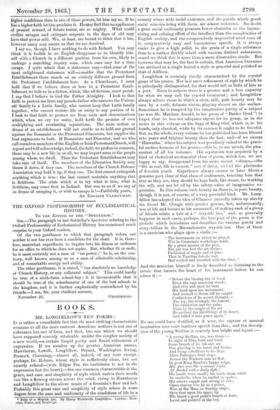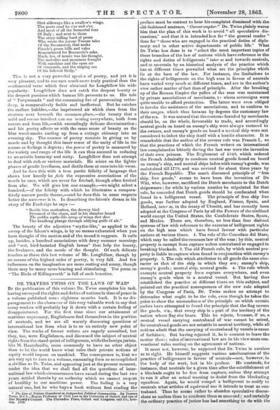BOOKS.
MR. LONGFELLOW'S NEW POEMS.* IT is rather a remarkable fact that the most striking characteristic common to all the more eminent American authors is not one of substance but one of form, and that, too, one which we should have supposed scarcely attainable amidst the rougher society of a new world,—a certain limpid purity and fluent refinement of expression. If we number up the greater American names, Hawthorne, Lowell, Longfellow, Bryant, Washington Irving, Prescott, Channing,—almost all, indeed, of any note except, perhaps, Dr. Holmes, whose style is sufficiently clear, but not exactly refined—(with Edgar Poe the turbidness is not in the expression but the heart),—the one common characteristic is the grace, and ease, and simplicity of style which makes their words run like a flowing stream across the mind, rising in Hawthorne and Longfellow to the silver music of a fountain's flow and fall. Probably this great ease and simplicity of style arises in some degree from the ease and uniformity of the conditions of life in a * Tales of a Wayside Inn. By Henry Wadsworth Longfellow. London: Rout. edge, Warne, and Routledge. country where wide social extremes, and the puzzle which great social miseries bring with them, are almost unknown. No doubt a great social uniformity presents fewer obstacles to the harmo- nizing and refining effort of the intellect than the complexities of English society, and the comparatively unpuzzled mind runs off in comparatively easy and harmonious speech. It is always easier to give a high polish to the grain of a single substance than to a surface thickly inlaid with various distinct substances, —and we think this is more than a mere illustrative simile. But however that may be, the fact is certain, that American literature has attained at a single bound a style as graceful and polished as that of Addison.
Longfellow is certainly chiefly characterized by the crystal grace of his poems. Nor is it mere refinement of style by which he is principally distinguished, for that would tell us little of him as a poet. Even in subjects there is a greater and a less capacity for what we may call the crystal treatment ; and Longfellow always selects those in which a clear, still, pale beauty may be seeu by a swift, delicate vision, playing almost on the surface. Sometimes he is tempted by the imaginative purity of a subject (as was Mr. Matthew Arnold, in his poem of" Balder Dead ") to forget that he has not adequate vigour for its grasp, as in the series in this volume on the Saga of King Olaf, which is, in his hands, only classical, while by its essence it ought to be forceful. But, on the whole, every volume he has published has been filtered into purer and brighter beauty than the last, and—if we except "Hiawatha," where his subject was peculiarly suited to the grace- ful surface humour of his genius,—this is, to our minds, the plea- santest of all his volumes. His reputation was acquired by a kind of rhetorical-sentimental class of poem, which has, we are happy to say, disappeared from his more recent volumes,—the "life is real, life is earnest" sort of thing, aml all the platitudes of feverish youth. Experience always sooner or later filters a genuine poet clear of that class of sentiments, teaching him that true as they are, they should be kept back, like steam, for working the will, and not let off by the safety-valve of imaginative ex- pression. In this volume such beauty as there is, is pure beauty, though it is not, of course, of a very powerful kind. Mr. Long- fellow has adopted the idea of Chaucer (recently taken up also by his friend Mr. Clough with greater genius, but, unfortunately, less of life and leisure at his command), of making each of a group of Meads relate a tale at a " wayside inn," and, as generally happens in such cases, perhaps, the best part of the poem is the prelude which introduces and describes the various guests and story-tellers in the Massachusetts wayside inn. One of them is a musician who plays upon a violin :— "The instrument on which he played
Was in Cremona's workshops made,
By a great master of the past,
Ere yet was lost the art divine ; Fashioned of maple and of pine, That in Tyrolian forests vast Had rocked and wrestled with the blast."
And the musician himself is finely described as listening to the music that haunts the heart of his instrument before he can educe it : —
"Before the blazing fire of wood Erect the rapt musician stood ; And ever and anon he bent His head upon his instrument, And seemed to listen till he caught
Confessions of its secret thought,—
The joy, the triumph, the lament, The exultation and the pain; Then by the magic of his art He soothed the throbbings of its heart, And lulled it into peace again."
No one could have distilled, as it were, the rapture ot musical inspiration into more lustrous speech than this ; and the descrip- tion of the young Sicilian is scarcely less bright and liquid :— "A young Sicilian, too, was there ;-
In sight of Etna born and bred, Some breath of its volcanic air Was glowing in his heart and. brain; And being rebellious to his liege After Palermo's fatal siege, Across the Western seas he fled, In good King Bomba's happy reign.
His face was like a summer night, All flooded with a dusky light ;
His hands were small; his teeth shone white As seashells, when he smiled or spoke; His sinews supple and strong as oak ; Clean shaven was he as a priest,
Who at the Mass on Sunday sings; Save that upon his upper lip
His beard a good palm's length at least,
Level and pointed at the top,
Shot sideways liko a swallow's wings. The poets read he o'er and o'er. And most of all the Immortal four Of Italy ; and next to those The story-telling bard of prose Who wrote the joyous Tuscan tales Of the Decameron, that make Fiesole's green hills and vales
Remembered for Boccaccio's sake. Much, too, of music was his thought, The melodies and measures fraught With sunshine and the open air Of vineyards, and the singing sea Of his beloved Sicily."
This is not a very powerful species of poetry, and yet it is very pleasant, and to our ears much more truly poetical than the sentimental verse which first obtained for Longfellow his wide popularity. Longfellow does not catch the deepest beauty or the deepest passions which human life presents to us. His tale of " Torquemada " and the consuming fire of persecuting ortho- doxy, is comparatively feeble and ineffectual. But he catches the surface bubbles,—the imprisoned air which rises from the stratum next beneath the common.place,—the beauty that a mild and serene intellect can see issuing everywhere, both from nature and from lifer—with exceedingly delicate discrimination ; and his poetry affects us with the same sense of beauty as the blue wood-smoke curling up from a cottage chimney into an evening sky. The essence of poetry consists in giving us by music and by thought this inner sense of the unity of life in the scenes or feelings it depicts ; the power of poetry is measured by the variety and range of the life it can thus succeed in reducing to an artistic harmony and unity. Longfellow does not attempt to deal with rich or various materials. He seizes on the lighter phases of gentle loveliness, and distils them at once into his verse.
And he does this with a true poetic felicity of language that shows how keenly he feels the expressive associations of the words he uses, which are never far fetched, though often fetched from afar. We will give but one example,—we might select a hundred,—of the felicity with which he illustrates a compara- tively narrow poetic theme,—and he does this in some respects better the narrower it is. In describing the falcon's dream in his story of Sir Frederigo he says :— " Beside him motionless, the drowsy bird Dreamed of the chase, and in his slumber heard The sudden scythe-like meg, of wings that dare
Tho headlong plunge through eddying gulfs of air."
The beauty of the adjective "scythe-like," as applied to the sweep of the falcon's wings, is by no means exhausted when you have thought of the motion and of the sound it suggests. It calls up, besides, a hundred associations with dewy summer mornings and "wet, bird-haunted English lawns" that help the beauty, the freshness, and the music of the thought. Of such delicate touches as these this last volume of Mr. Longfellow, though by no means of the highest order of poetry, is very full. And few influences on the imagination are more resting and sunny, though there may be many more bracing and stimulating. The poem on "The Birds of Killingworth" is full of such beauties.































 Previous page
Previous page